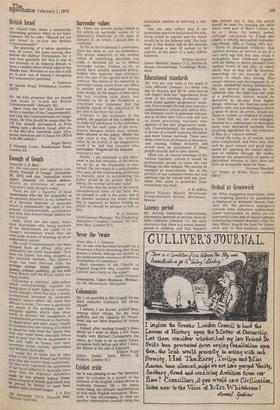Latency period
Sir: Among numerous controversial statements asserted as proven facts by John Linklater (January 11), the most obvious is that there is a sexual latency period in children, and that Nature's idea behind this is that the period should be used for learning the skills which were part of Man's culture. As far as I know, the latency period, although advocated by Freud and others, is wholly discounted nowadays (see Kinsey, 1949, or Young, 1971 etc).
There is abundant evidence that children develop an interest in sex at a very early age and that they retain it throughout their childhood, together with an ability to derive pleasure from various forms of sex play in which adults may or may not be involved, depending on the customs of the society to which they belong. This sexual interest and development is, of course, intensified during adolescence. We are invited to suppose by Dr Linklater that the eight-year-old child of a prehistoric hunter would be distracted by sex-play from higher things, whereas his fourteen-year-old brother, who was just learning to throw a spear or shoot an arrow, would not. There is, indeed, no evidence or reason to think that sex, not over-indulged, whether in a rudimentary or developed form, ever distracted anybody from anything significant for the evolution of Man as a 'cultural animal'.
Social life today is, of course, much more complicated, and there may very well be good reasons and good arguments for opposing the sexual education of children through the media. However the presentation of myths or discredited theories as facts does not form an acceptable basis for them. Norman Marshall 117 Prince of Wales Drive, London SW11


































 Previous page
Previous page